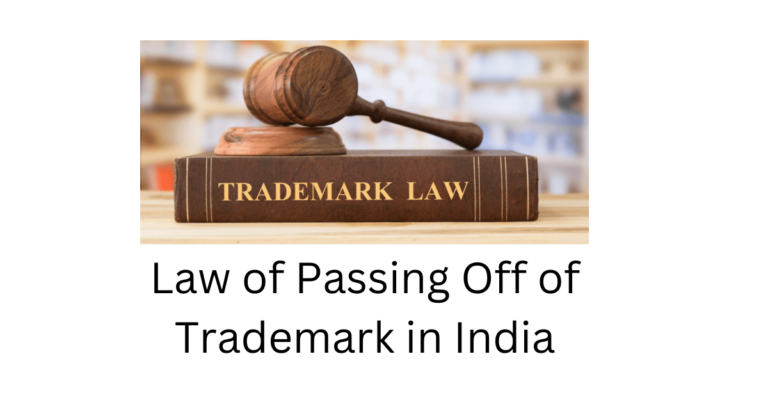Are you aware that you can seek protection for your unregistered trademarks from being used without your permission? Yes, this use is considered passing off of trademark and is subject to civil remedies.
What is Passing-off in Trademarks?
Passing-off in IPR is not a new concept. The law of passing off is a civil wrong that dates back to a time when there was no codified legislation protecting trademark from malicious infringers. However, the term “passing off of trademarks” is now commonly used in reference to unregistered trademarks. Passing off occurs when a person sells his goods or services as those of another in order to profit from the goodwill and reputation of that trademark in the market. In layman’s words, the law of passing off implies passing off your own product under the name of an already existing and reputable trademark in order to deceive consumers and profit from the trademark’s goodwill. The famous case of Perry v. Truefitt established the principle of passing off, which states, “No one has the right to portray his commodities as the goods of someone else”.
For example, if a person begins selling burgers under the name ‘MAC-E,’ this may give consumers the impression that this place is an extension of the sequel of the famous burger chain called ‘MAC-D,’ and this confusion in the minds of consumers, as well as the intention of the person selling burgers to create such confusion, results in passing off of trademark.
Passing off v. Infringement
As was indicated before, it is frequently observed that the law of passing off is only applicable to unregistered trademarks, and that the term “infringement” is used to refer to the unauthorized use of registered trademarks. The law of passing off is based on civil law, and no criminal proceedings can be brought in the case of passing off, with the remedies being in the form of damages. However, in cases of trademark infringement, criminal action might be taken against the infringer. The ‘intention’ is another point of differentiation between passing off and infringement. It is possible to infringe on a trademark without being aware of what is being done, which means that there need not be any malicious intent behind the action. On the contrary, the wrong of passing off is only committed when there is intent to ride on the reputation of another person’s trademark.
In the case of Kaviraj Pandit Durga Das Sharma v. Navaratna Pharmaceutical, the Supreme Court highlighted the fact that a passing off is a form of common law remedy, whereas infringement has traditionally been a statutory form of remedy.
Essential Ingredients of Passing Off
Similar to any other civil wrong, the tort of passing off requires the presence of certain elements in order to establish liability for the infringement of a trademark. When there is misrepresentation, and it is harmful to the existence of the plaintiff’s goodwill, when it is made by a trader in the course of trade, when it is injurious to the business of another trader, and when it causes actual damage to the business or goodwill of the trader against whom the action is brought, a passing off action can arise.
However, as a result of the case Reckitt & Colman Products Ltd. v. Borden Inc., the number of essential conditions for the passing off action was lowered to three. These essential elements are also called as the ‘Classic Trinity’, and are as follows:
1. Goodwill in the market
It is essential to have goodwill in the market in order to bring a passing action, and the plaintiff has the burden of proving that either he or his trademark has an unmatched goodwill in the market. He is required to provide evidence that consumers link only his goods or services with the trademark in question.
In the case of CIT v. B.C. Srinivas Seti, it was determined that goodwill is influenced by everything that is associated with the business. This includes the personality of the owners of the business, the nature and character of the business, the name and reputation of the business, its location, its influence on the modern market, and the current socioeconomic psychology.
2. Misrepresentation
The third fundamental component is misrepresentation, and the plaintiff has the burden of proving that the defendant has in fact committed the act of misrepresenting his own items or services as belonging to the plaintiff. Misrepresentation is done with the intention of misleading the general public, which goes against the very point of trademark law.
In the case of Khemraj v. Garg, the defendants had duplicated the plaintiff’s panchang’s appearance, layout, design, colour scheme, etc., as well as the names “manavpanchang, mani ram panchang,” and “shri vallabh Mani Ram panchang.” The court determined that the defendant’s product is identical to the plaintiff’s, and an interim injunction was issued.
3. Damage to the goodwill
The final element that must be established is that the plaintiff’s goodwill has been damaged as a result of the defendant’s passing off. It means that either consumer are purchasing the counterfeit items believing they are the plaintiff’s or the counterfeit products are of such poor quality that consumers discontinue purchasing the plaintiff’s genuine products.
Conclusion
Section 27 of the Indian Trademarks Act, 1999 states that although the owners of an unregistered mark cannot file a suit for the infringement of their marks, this does not limit their right to protect their trademark against those who use it to gain an unfair advantage, and an action for passing off can be brought. In conclusion, the action of passing off is mostly for infringement of unregistered marks, but it is also relevant in cases of registered trademarks along with the infringement suit if the infringer attempts to purposefully confuse consumers by passing off another’s products as his own.







